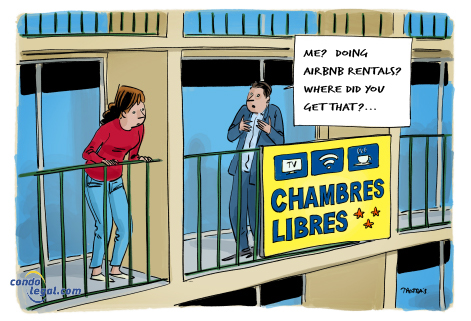Limits of renting in divided co-ownership
 In recent years, there has been a trend towards renting units held in divided co-ownership in large urban centres as well as in resort centres. Although renting a property is a recognized ownership right for a co-owner, he must know the rules applicable in this matter. The law and the declaration of co-ownership list the obligations to which tenants and co-owners-lessors commit themselves when they sign a lease, such as compliance with the by-laws of the immovable. Some of these obligations can cause the resiliation of the lease if they are not respected !
In recent years, there has been a trend towards renting units held in divided co-ownership in large urban centres as well as in resort centres. Although renting a property is a recognized ownership right for a co-owner, he must know the rules applicable in this matter. The law and the declaration of co-ownership list the obligations to which tenants and co-owners-lessors commit themselves when they sign a lease, such as compliance with the by-laws of the immovable. Some of these obligations can cause the resiliation of the lease if they are not respected !
Adjustment of the rental right
The declaration of co-ownership may validly contain restrictions on the right to rent a private portion, if these are justified by the notion of destination of the immovable, that is to say, the use for which the building is reserved. The Court of Appeal has recognized that tenancy can be regulated, even if the declaration of co-ownership does not include any provision in this regard. For example, in a co-ownership of an exclusively residential character, the by-law of the immovable may prohibit short-term rentals. The objective is to prevent a co-ownership from turning it into a hotel, so that the occupants who live there can live in harmony.
You should know that the residential destination of the immovable is incompatible with very short-term rentals, weekly or day rentals for example, such as Airbnb or hotel, in any form whatsoever. It is also contrary to the purpose of the immovable to grant, repeatedly, rentals or authorizations to occupy the units for periods of less than one (1) year.
Penal clause
In addition, the declaration of co-ownership may provide, by means of a penal clause, for fines resulting from the failure (by a co-owner) to comply with the by-laws of the immovable (article 1622 of the Civil Code of Quebec). In such circumstances, the co-owner at fault would be required to pay a lump sum to the syndicate as damages.
Remember that the building by-law (or the amendments made to it) may be set up against the tenant, as soon as a copy of the by-law or the amendments made to it is given to the tenant by the co-owner or, failing that, by the syndicate of co-owners.
This principle was implemented in a decision of the Administrative Housing Tribunal. In this case, the tenant of a co-owner had sublet his home on the Airbnb platform. Since this lease was contrary to the rules of the building, the co-owner received a fine of $ 1000. He then claimed from his tenant the amount he had had to pay to the syndicate.
However, since the tenant had not been made aware of this short-term rental ban, the Administrative Housing Tribunal refused to hold the tenant liable for the fine.
Clause deemed illegal by the Quebec Court of Appeal
Where the declaration of co-ownership defines the destination of the immovable as being residential, the meeting of co-owners may not, by an absolute majority, amend the declaration of co-ownership in such a way as to limit the proportion of units leased in the immovable. Thus, the Quebec Court of Appeal recalled in a decision that the amendment of the declaration of co-ownership can only take place if it proves to be justified by the destination of the immovable, its characteristics or its situation, as stated in article 1056 of the Civil Code of Quebec. As for article 1063 of the Civil Code of Quebec, it provides for the right of co-owners to freely use and enjoy their private portion. The Court concluded that the restrictions on the co-owners' rental right constitute much more than a simple development or a framework for the rental right. They increase the proportion of units that can be rented from 100% to 10%. Concretely, this has had the effect of denying many co-owners the right to rent their unit, even though this is one of the attributes of the property right protected by Article 1063 C.C.Q. and expressly provided for in the declaration of co-ownership.
Moreover, the indeterminable nature of the duration of the restriction and the fact that there is no way of predicting when the rental rate will fall below 10 per cent jeopardizes the legitimate or foreseeable exercise of the rental right, making it impossible to plan the use of such a right. This practical and concrete difficulty fundamentally affects the rental right, amounting to denying its existence, and cannot be part of the extension of the destination of the immovable on the pretext that the majority of co-owners would like it. Remember that to change the destination of the immovable, only a vote of the meeting of co-owners can allow it, and this by a majority of three-quarters of the co-owners, representing 90% of the votes of all the co-owners (article 1098 of the Civil Code of Quebec).
 WHAT YOU SHOULD KNOW! As a co-owner, you have the right to rent your apartement to whomever you want. The syndicate of co-owners cannot intervene on your choice, provided that your tenant respects the rules established in the building regulations.
WHAT YOU SHOULD KNOW! As a co-owner, you have the right to rent your apartement to whomever you want. The syndicate of co-owners cannot intervene on your choice, provided that your tenant respects the rules established in the building regulations.
 WHAT TO KEEP IN MIND: The validity of a clause in the declaration of co-ownership restricting the right to rent a private portion (e.g. an apartment, a parking or locker space) is subject to the discretion of the courts. The Court of Appeal has ruled on the subject on more than one occasion.
WHAT TO KEEP IN MIND: The validity of a clause in the declaration of co-ownership restricting the right to rent a private portion (e.g. an apartment, a parking or locker space) is subject to the discretion of the courts. The Court of Appeal has ruled on the subject on more than one occasion.
 WARNING! The right to rent of a co-owner is an integral part of his right of ownership. However, this right knows its limits. Thus, the declaration of co-ownership may, in certain circumstances, restrict this right to rent.
WARNING! The right to rent of a co-owner is an integral part of his right of ownership. However, this right knows its limits. Thus, the declaration of co-ownership may, in certain circumstances, restrict this right to rent.
Back to the factsheets





